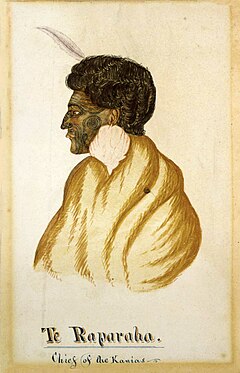カ・マテ
「カ・マテ (Ka Mate)」は、ニュージーランド北島のンガーティ・トア族の戦争指導者テ・ラウパラハによって作られたマオリのハカである。

構成 編集
テ・ラウパラハは1820年頃、敵のンガーティ・マニアポト族とワイカト連合の追跡から幸運にも逃れたことを生涯の祝いとして「カ・マテ」を作曲した[1][2]。彼はパータカ(pātaka, 食料貯蔵庫)に隠れ、彼に友好的な族長テ・ファレアンギ(Te Whareangi, 「毛むくじゃらの男」)に会うためにそこから戻った。
テ・ラウパラハの作曲したハカは、チャントから始まる: [1] [2]
Kikiki! Kakaka! |
Let your valor rise! Let your valor rage! |
次に、ハカの本体に続く。
Ka mate, ka mate! ka ora! ka ora! |
'Tis death! 'tis death! (or: I may die) ’Tis life! ‘tis life! (or: I may live) |
「カ・マテ」は、一定の動きがない場合に、同調させることなく好きなように声の調子や動きを自由に表現できる、一種のンゲリ(ngeri)型の短くエネルギーがあるハカの一種として考案された[3]。
ラグビーにおける使用 編集
| 映像外部リンク | |
|---|---|
| "Ka Mate", accompanied by a translation — via YouTube |
「カ・マテ」はニュージーランドで最も広く国際的に知られているハカである。なぜなら、この歌はニュージーランドの国際ラグビーユニオンチームであるオールブラックスとニュージーランドの国際ラグビーリーグチームであるキーウィズが、テスト(国際)マッチの直前に振付および同期されたバージョン[3]を伝統的に行ってきたからである。2005年以来、オールブラックスは時折、「カパ・オ・パンゴ」という別のハカを行ってきた。「カパ・オ・パンゴ」の導入以来、オールブラックスの「カ・マテ」の最長連続公演は、2009年8月22日から2010年6月12日までの九回である。
所有権 編集
1998年から2006年の間、ンガーティ・トアは「カ・マテ」の商標登録を試み、商業団体に許可なく使用されることを防ごうとした[4][5]。2006年、ニュージーランド知的所有権庁は、「カ・マテ」が特定の業者ではなくニュージーランド全体を代表するものとしてニュージーランド内外で広く認識されていたとして、その主張を拒絶した。2011年3月、ニュージーランドラグビー協会は、ハカのマナを不名誉にしないというイウィとの友好的な合意に達した[6]。
2009年、ニュージーランド政府は、より広範な苦情処理の一環として、以下のことに同意した。
関連項目 編集
- スポーツにおけるハカ
- 大衆文化の中でのハカ
- カパ・ハカ
- ニュージーランドのラグビーユニオンのハカの公演の一覧 -2005年に「カパオパンゴ」が紹介されて以来
- マオリ音楽
脚注 編集
- ^ a b Pōmare (2014年2月12日). “Ngāti Toarangatira – Chant composed by Te Rauparaha”. Te Ara – the Encyclopedia of New Zealand. Ministry for Culture & Heritage. 2015年8月31日閲覧。
- ^ a b “Haka Ka Mate Attribution Act 2014 Guidelines” (pdf). Ministry of Business, Innovation & Employment. 2016年1月23日時点のオリジナルよりアーカイブ。2015年8月31日閲覧。
- ^ a b Jackson, SJ; Hokowhitu, B (2002). “Sport, Tribes, and Technology: The New Zealand All Blacks Haka and the Politics of Identity” (英語). Journal of Sport and Social Issues 26 (2): 125–139. doi:10.1177/0193723502262002. ISSN 0193-7235.
- ^ “All Blacks fight to keep haka”. news.bbc.co.uk. (2000年7月16日) 2008年5月3日閲覧。
- ^ “Iwi threatens to place trademark on All Black haka”. New Zealand Herald. (2005年5月22日) 2008年5月3日閲覧。
- ^ “Iwi claim to All Black haka turned down”. New Zealand Herald. (2007年7月2日) 2008年5月3日閲覧。
- ^ Ngāti Toa Rangatira Letter of Agreement Archived 21 May 2010 at the Wayback Machine.
- ^ “New Zealand Maori win haka fight”. BBC News. (2009年2月11日)
外部リンク 編集
- 「Ka Mate」の裏話 –録音を含む
- ハカの別の異なる翻訳 – 翻訳の背後にある意味を伝える
- Ka Mateの古代バージョン – 10の異なる情報源からの「カ・マテ」の比較研究。